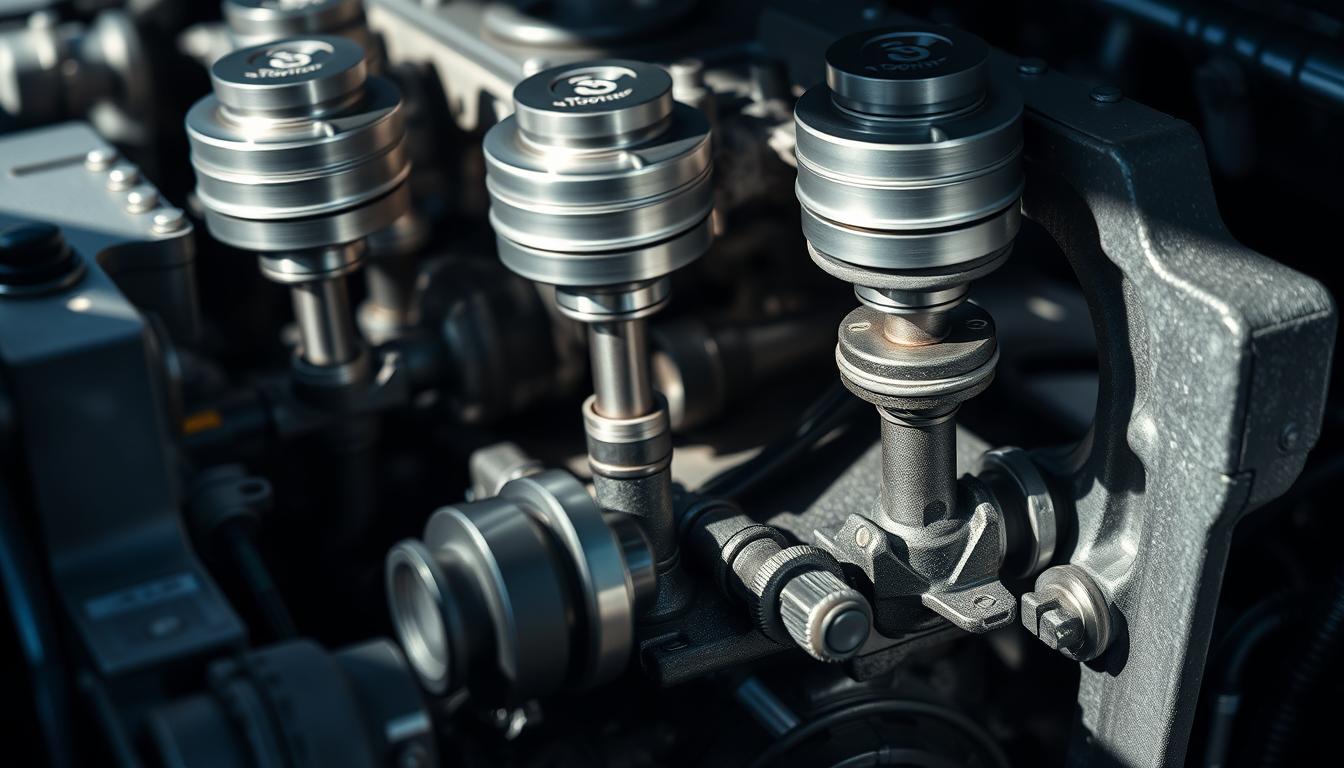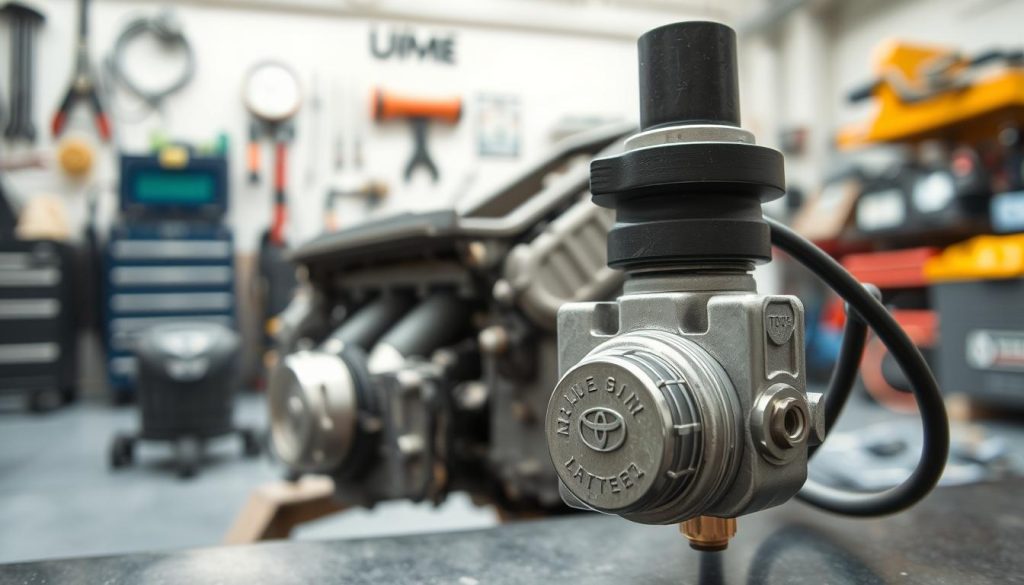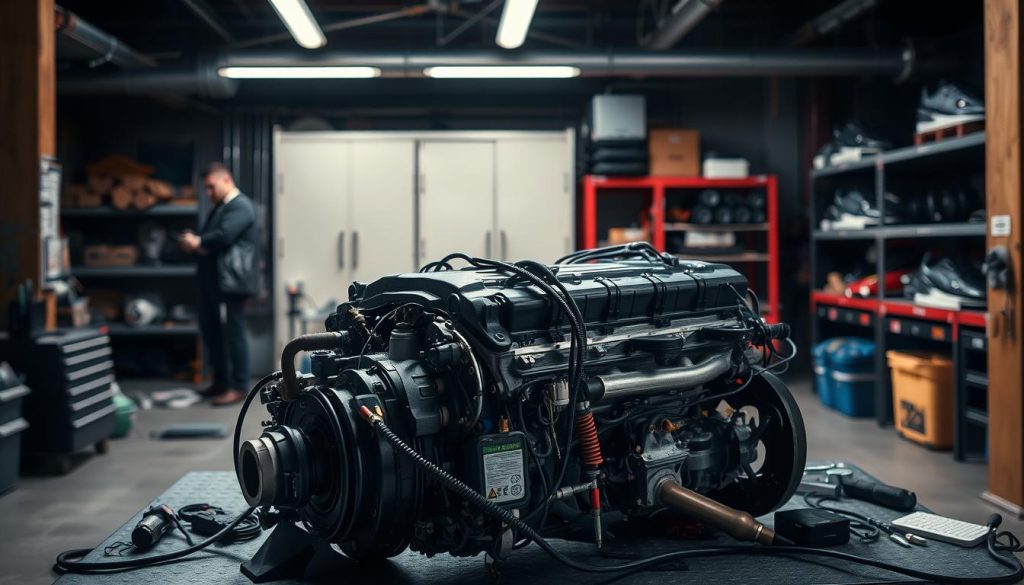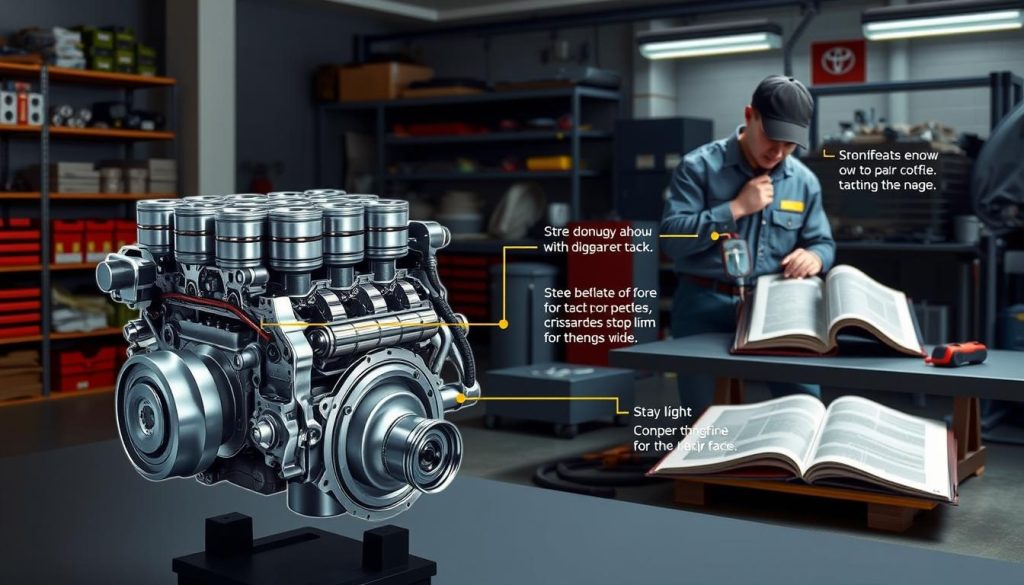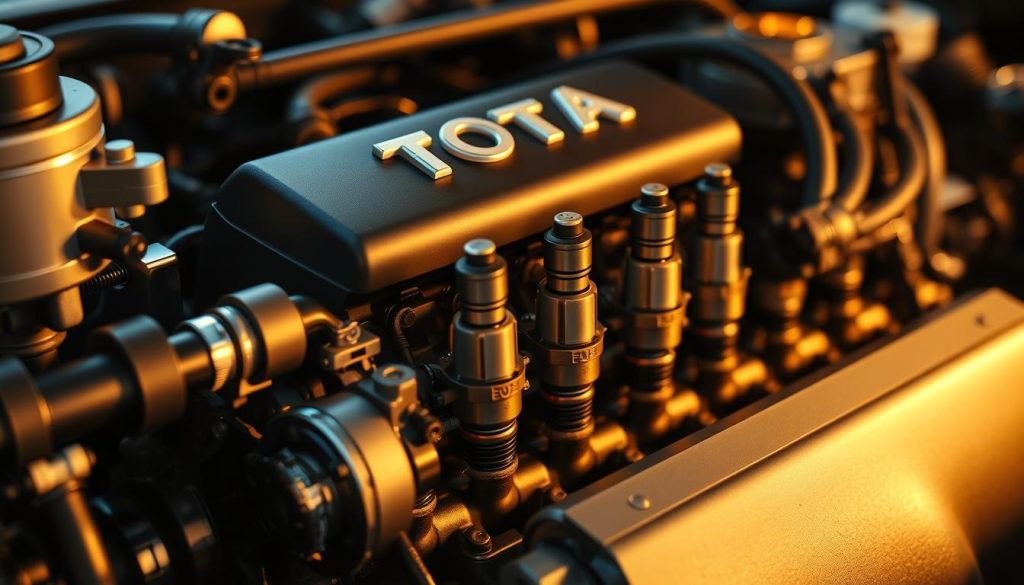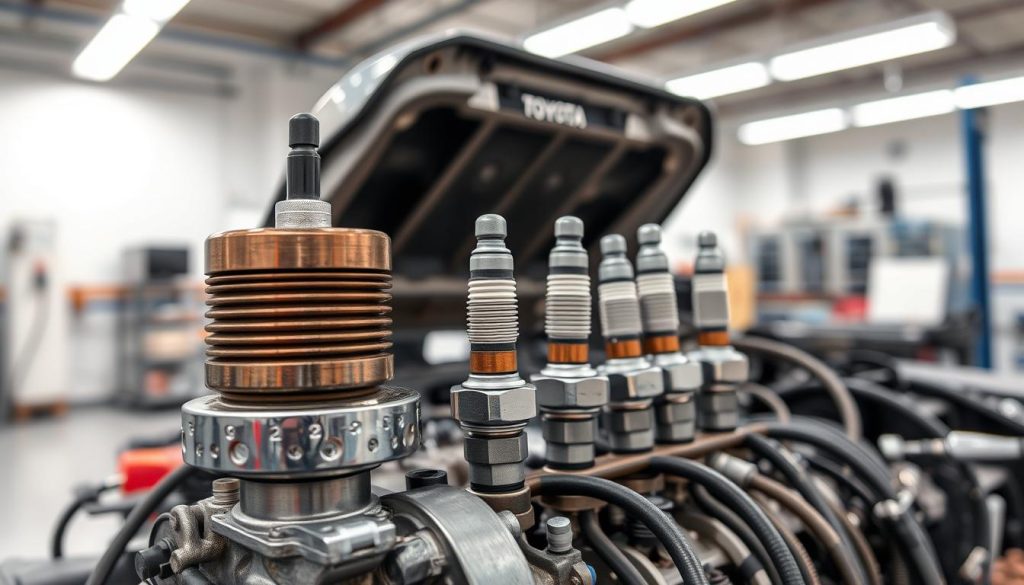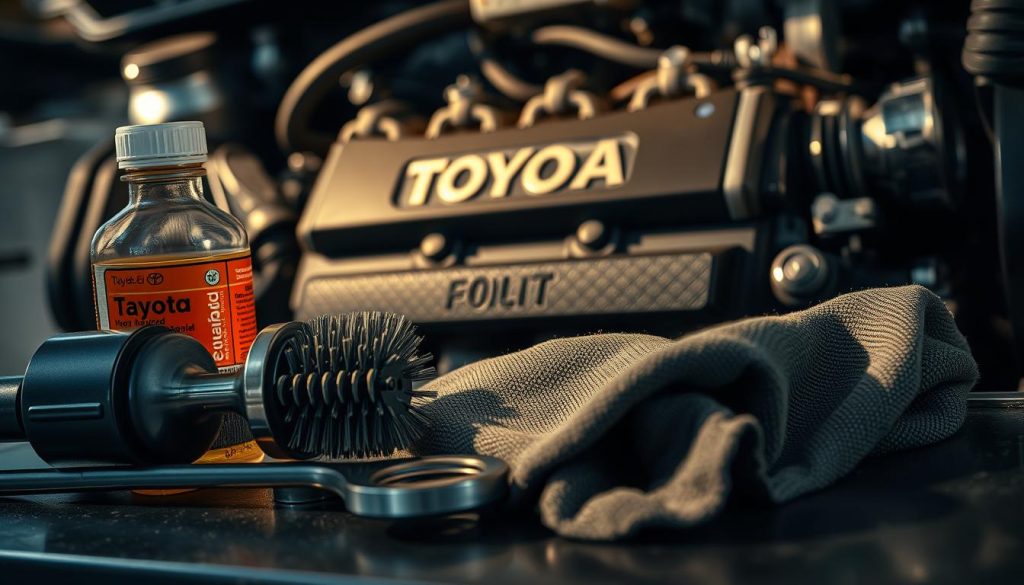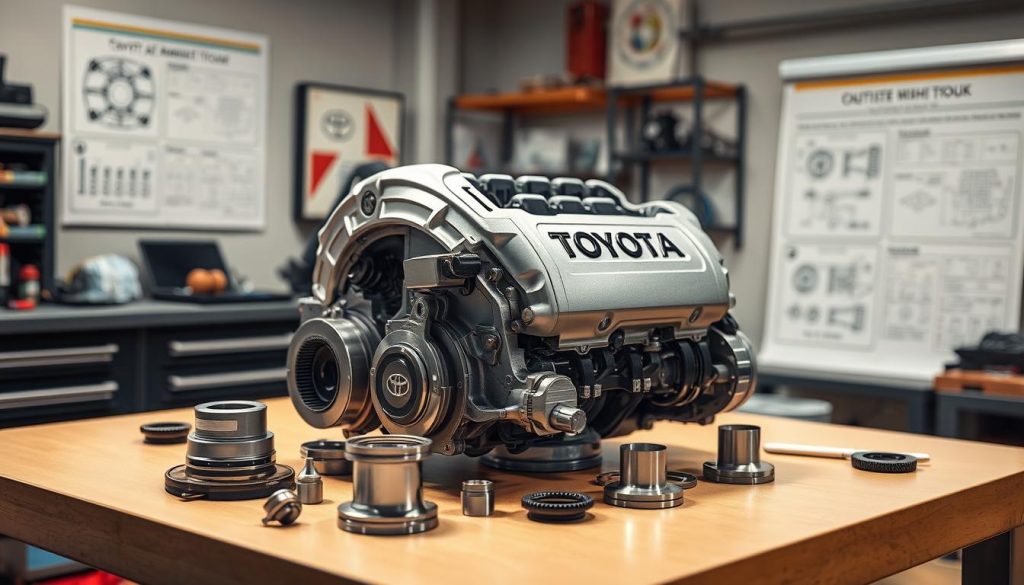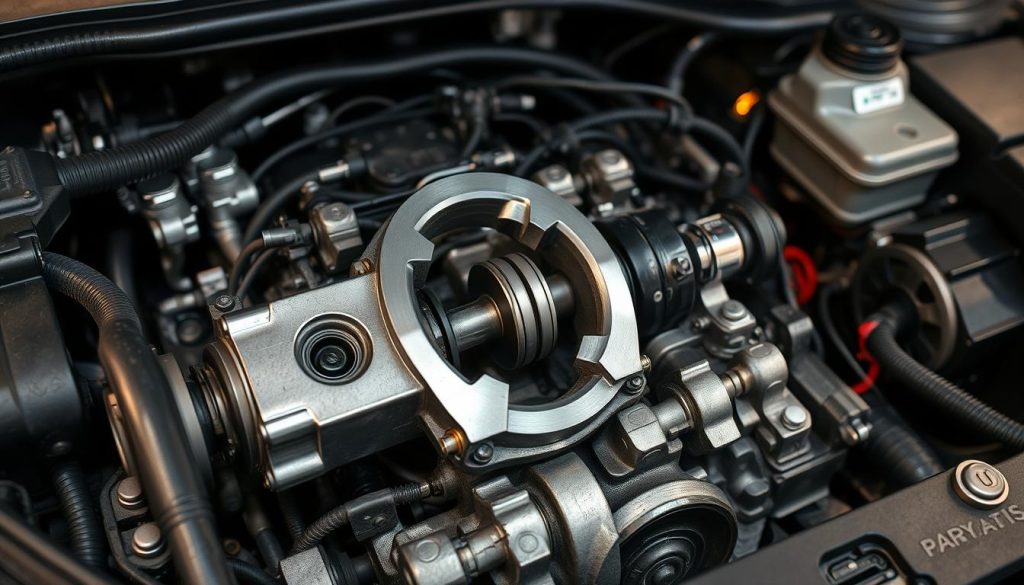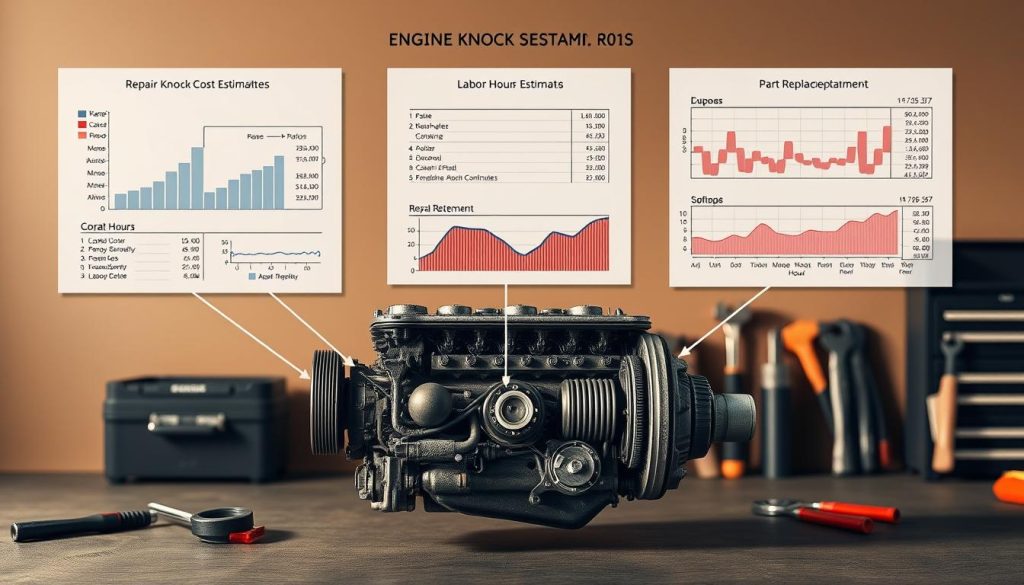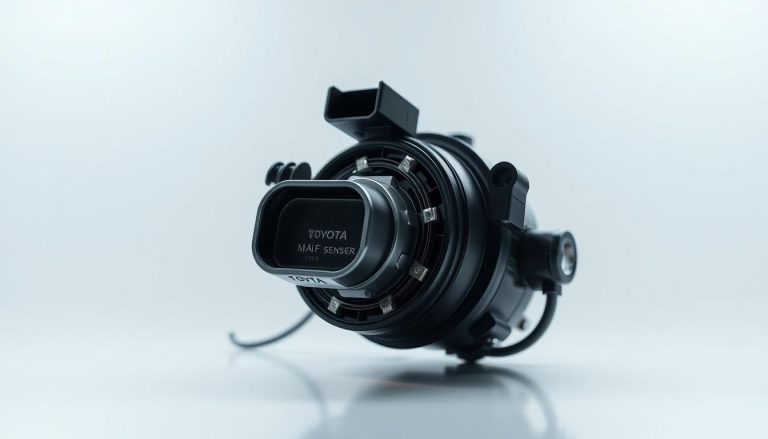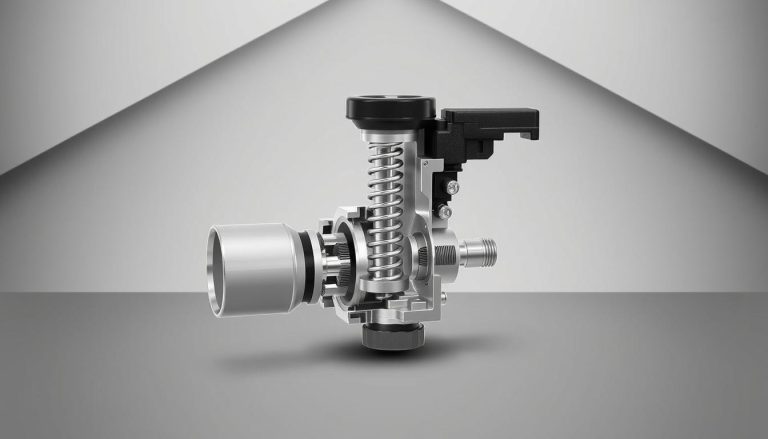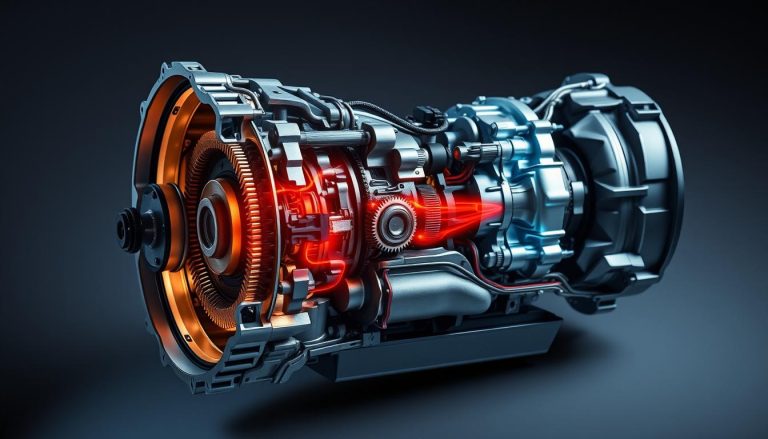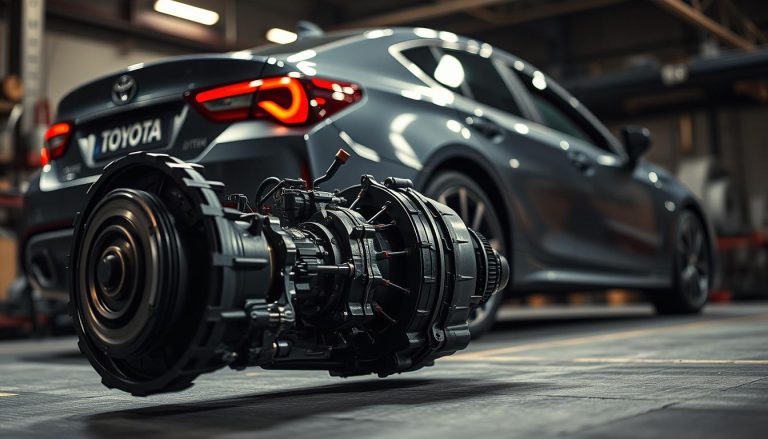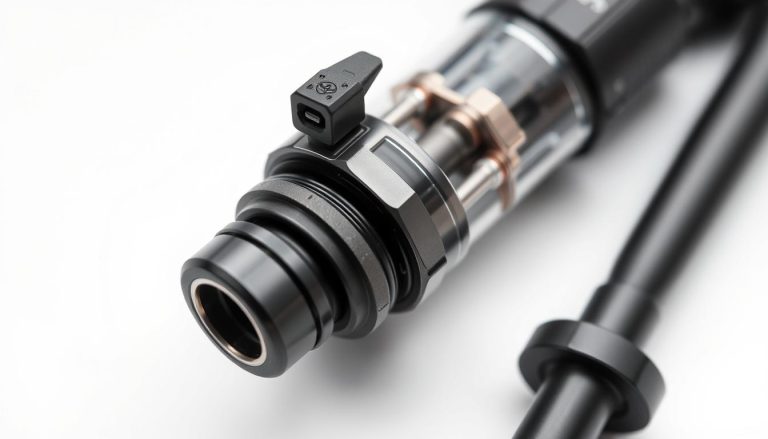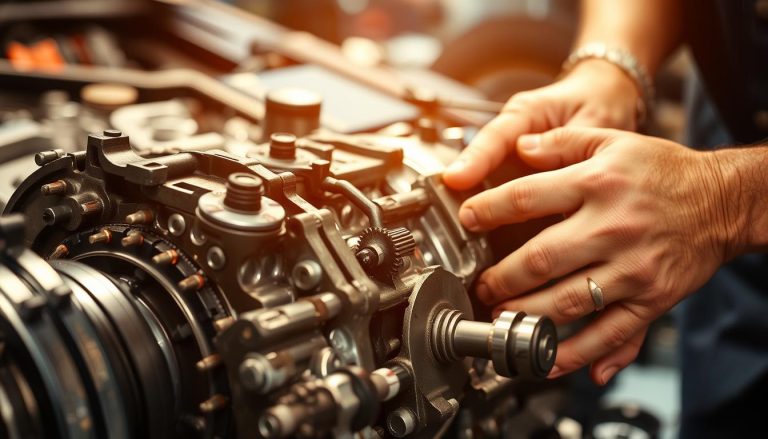Understanding Toyota Engine Knock: Symptoms and Fixes
That metallic tapping sound from under your hood is not something to ignore. Toyota engine knock occurs when your car’s engine doesn’t work right or when metal parts rub against each other.
Fuel mixes with air, gets compressed, and then ignites smoothly from the spark plug. This controlled combustion powers your pistons. But if this process fails, you’ll hear a knocking sound.
Even the most reliable Toyotas can get this problem. Many things can cause engine knock causes, like bad fuel or carbon buildup.
Your car is trying to tell you something with these sounds. If you ignore them, you might face costly repairs or even engine failure. Quick action saves money and prevents big damage.
Knowing about this issue helps protect your investment. This guide will show you how to spot warning signs and fix them. This way, your vehicle will run smoothly.
Key Takeaways
- Engine knocking means your engine isn’t working right or metal parts are hitting together.
- Even the most reliable Toyotas can get this problem because of many factors.
- Ignoring knocking sounds can lead to expensive repairs and engine damage.
- Spotting and fixing problems early can save a lot of money.
- Your vehicle uses sounds to tell you it has problems that need fixing.
- Knowing why it happens helps prevent it from happening again.
What Is Engine Knock in Toyota Vehicles
Engine knock is a serious Toyota engine problem that drivers worry about. It happens when the air and fuel mix in your Toyota’s cylinders too early. This leads to chaotic explosions instead of smooth burning.
Toyota engines are built for precise timing in burning fuel. Normally, the spark plug lights the fuel mix at the perfect time. This creates a smooth motion as the piston moves down.
But when engine knock occurs, flames crash into each other in the cylinder. This makes a loud, metallic pinging or tapping sound. Some people say it sounds like metal plinking against metal or a constant knocking.
The knocking sound is loudest when you’re speeding up or going uphill. Your Toyota’s engine works harder then, making the knocking sound more obvious. This isn’t just a noise problem; it’s a sign of serious engine trouble.
Toyota’s high standards make engine knock a big issue. These cars are made for lasting performance and smooth running. When engine knock repair is needed, it means your Toyota’s systems are off balance.
Engine knock does more than just make noise. It lowers your car’s performance, cuts fuel efficiency, and can harm your engine over time. The uneven burning puts extra stress on pistons and other parts.
Knowing about this problem helps you spot when you need a pro’s help. Catching it early and getting it checked out can stop small problems from turning into big repairs.
Root Causes Behind Toyota Engine Knock
Several factors can cause engine knock in Toyota vehicles. Each one needs a different fix. Knowing the root cause helps find the right solution for your car.
Toyota engines need precise settings for best performance. If these settings are off, engine knock is more likely.
Low Octane Fuel Problems
Using the wrong fuel octane is a common cause of engine knock. Your Toyota engine needs a specific octane level to avoid pre-ignition during compression.
Using regular 87-octane in a 91-octane engine causes early ignition. This leads to knocking sounds and weak engine power.
Carbon Buildup Issues
Carbon deposits build up over time, even with good gasoline. These deposits create hot spots that ignite fuel too early.
Toyota’s direct injection engines, like in the Camry and RAV4, are prone to carbon buildup. Deposits on intake valves and piston tops disrupt combustion.
Ignition Timing Problems
Toyota’s ignition timing systems can be off due to wear or wrong settings. If timing advances too much, spark plugs fire too early.
A faulty knock sensor can’t detect pre-ignition. This keeps knocking, damaging engine parts.
Engine Temperature Factors
Overheating is perfect for engine knock, raising combustion chamber temperatures. Low oil and cooling system issues also play a part.
| Root Cause | Primary Effect | Toyota Models Most Affected | Severity Level |
|---|---|---|---|
| Low Octane Fuel | Pre-ignition | All turbocharged models | Moderate |
| Carbon Buildup | Hot spot ignition | Direct injection engines | High |
| Timing Issues | Early spark firing | 2.4L and 3.5L engines | High |
| Overheating | Elevated temperatures | High-mileage vehicles | Critical |
How to Identify Toyota Engine Knock Symptoms
Spotting engine knock symptoms early can prevent expensive repairs and damage. Your Toyota will show clear signs when knock happens. Knowing these signs lets you act fast before things get worse.
Engine knock can change how your car runs. You might notice small changes during daily use. These small signs often mean big problems are brewing under the hood.
Distinctive Knocking and Pinging Sounds
The most obvious sign of engine knock is the sound. You’ll hear a metallic pinging noise like marbles in a can. This noise is most noticeable when you speed up or go uphill.
Toyota engines make a repetitive tapping sound when knock happens. The sound gets louder based on how bad the problem is. Listen carefully during acceleration – that’s when knock sounds are clearest.
Some drivers say the noise sounds like metal plinking against metal. This sound pattern helps you tell engine knock from other noises. The pinging usually matches your engine’s RPM and gets louder when you’re under load.
Performance Degradation Signs
Engine knock affects your Toyota’s performance. You’ll feel reduced acceleration when trying to merge or climb steep roads. Your engine might feel slow even when driving normally.
Fuel efficiency drops a lot when knock happens. Your Toyota will use more gas to get the same power. This is because combustion timing gets less efficient during knock events.
Rough idling often goes with engine knock problems. Your engine might shake or vibrate more at traffic lights. These issues get worse over time without fixing spark plugs or other repairs.
Dashboard Warning Indicators
Modern Toyotas use advanced engine diagnostics to spot knock. The check engine light turns on when knock sensors find abnormal combustion. This warning system helps protect your engine.
Some Toyotas show specific error codes for knock detection. Your onboard computer checks combustion with special sensors. When it finds irregular patterns, it shows warning lights.
Don’t ignore dashboard warnings – they’re early signs of serious problems. Toyota’s systems can catch knock before you hear it. Acting fast when lights come on can prevent expensive engine damage.
Step 1: Conducting Initial Engine Knock Assessment
When your Toyota engine starts knocking, a careful first check can save you money and time. You don’t need fancy tools or a pro to do it. Smart Toyota maintenance means knowing what’s happening under the hood.
Start by noting when the knocking happens. Keep track of the engine temperature, driving conditions, and fuel type. This info helps you guess what might be wrong before you look closer.
Visual Inspection Checklist
First, check the engine oil dipstick. Look at the level and color of the oil. Dark, thick oil or low levels can cause knocking sounds in your Toyota engine.
Next, search the engine bay for signs of trouble. Look for oil leaks, loose connections, or buildup around the air intake. Check for carbon deposits near the throttle body or intake manifold.
Then, gently push on different parts of the engine. Worn engine mounts can make knocking sounds. If the engine moves too much, it might be the problem.
Basic Sound Identification
True engine knock sounds sharp and metallic, getting louder as the engine speeds up. It’s different from the clicking of fuel injectors or a loose heat shield. Listen carefully during acceleration – real knock happens under load.
Have someone rev the engine while you listen from different spots. Engine knock usually comes from deep inside the engine block, not from accessories or outside parts.
Driving Condition Analysis
Pay attention to when the knocking happens during your drives. Does it happen during cold starts, highway acceleration, or climbing hills? Effective engine knock prevention means knowing these patterns.
Try different driving scenarios in a safe place. Test gentle versus aggressive acceleration. See if premium fuel makes the knocking better than regular gasoline.
Step 2: Using Diagnostic Tools for Detection
Professional tools are key to finding engine knock causes that are hard to spot. Modern Toyotas have advanced systems that track engine performance. These tools help find problems with great accuracy.
There are three main ways to find engine problems. Each tool has its own role in finding issues. Mechanics use these tools every day to fix complex problems.
OBD-II Scanner Usage
Toyotas made after 1996 have an OBD-II diagnostic port. This port connects to scanners that check engine performance. It stores trouble codes when problems arise.
Basic OBD-II scanners cost between $30 and $150. BlueDriver and Autel scanners work well with Toyotas. Just plug it in and follow the instructions to get codes.
Knock Sensor Testing
Toyota engines have knock sensors to catch abnormal sounds. These sensors send signals to the engine computer. Testing involves checking sensor voltage and wiring connections.
Knock sensors are usually on the engine block or cylinder head. You can test them by tapping near the sensor and watching voltage readings. Faulty sensors can miss carbon deposits and other issues.
Engine Stethoscope Application
Engine stethoscopes help find where knocks are coming from. They amplify engine sounds through a probe. This tool helps tell normal sounds from problem sounds.
It’s important to be safe when using these tools. Never work on a hot engine or remove parts without knowing what you’re doing. Some tasks need a pro to avoid damage.
Step 3: Immediate Response to Engine Knock
When your Toyota engine knocks, acting fast is key. It can prevent major damage or even save your engine. Don’t ignore strange sounds, lights, or performance problems. Early action can avoid costly fixes.
Knowing when to slow down or stop is critical. Assessing how bad the knock is helps decide what to do next.
Safe Driving Protocols
Slow down right away if you hear engine knock. Avoid hard starts and keep RPMs under 2,500 to ease engine stress. Use ECO mode if your car has it.
Take routes with fewer hills and less stop-and-go traffic. Driving on highways at steady speeds might help. Keep an eye on your engine temperature while driving.
Emergency Shutdown Procedures
Severe knocking and oil pressure warnings mean you must shut down the engine. Pull over and turn it off if you hear continuous metallic hammering sounds.
Call for help if knock happens with overheating or timing issues. Driving on with severe knock can harm pistons, rods, and bearings quickly.
“Engine knock is your car’s way of screaming for help – listen to it before it’s too late.”
Step 4: Fuel System Solutions
Keeping your Toyota’s fuel system in check can stop engine knock before it gets worse. The fuel system ensures clean, pressurized fuel reaches the engine. But, when it fails or gets dirty, engine knock can happen.
Fixing the fuel system is often cheaper and easier for Toyota owners to do themselves. These fixes tackle common fuel problems that cause engine knock. They also help avoid costly repairs in the long run.
Upgrading to Premium Gasoline
Many Toyota engines run better with higher octane fuel, like V6 models in the Camry, Highlander, and Avalon. Premium gasoline resists pre-ignition that causes knock sounds. Always check your owner’s manual for the recommended octane rating.
Regular gasoline is usually 87 octane, while premium is 91-93. Higher octane fuel burns slower and more evenly. This prevents the quick pressure spikes that cause knocking sounds.
Try premium fuel for at least three tank fills to see if it helps. If knocking continues, the issue might be deeper.
Fuel Injector Cleaning Process
Carbon deposits on fuel injectors mess up fuel spray patterns, leading to lean spots that cause engine knock. Toyota’s direct injection systems are more prone to this buildup over time.
Use quality fuel additives every 3,000 miles to stop carbon buildup. Add the additive to your fuel tank before filling up. Brands like Chevron Techron or Lucas Fuel Treatment work well with Toyota engines.
Professional injector cleaning costs $150-300 but is thorough when DIY methods fail. This investment can save you from more expensive repairs later.
Fuel Filter Replacement
A clogged fuel filter limits fuel flow, leading to lean fuel conditions that cause engine knock. Most Toyota models need fuel filter replacement every 30,000-40,000 miles, though some newer models have lifetime filters.
Fuel filters are usually near the fuel tank or along the fuel rail. Signs of a failing filter include poor acceleration, engine hesitation, and more frequent knocking during acceleration.
| Toyota Model | Filter Location | Replacement Interval | Average Cost |
|---|---|---|---|
| Camry (2012-2017) | Fuel tank | 40,000 miles | $120-180 |
| Corolla (2014-2019) | Engine bay | 30,000 miles | $80-120 |
| RAV4 (2013-2018) | Fuel tank | 35,000 miles | $100-150 |
| Highlander (2014-2019) | Fuel rail | 40,000 miles | $130-200 |
Regular fuel filter maintenance stops expensive repairs and cuts down engine knock costs. Clean fuel systems run more efficiently and make fewer knocking sounds.
Step 5: Ignition System Repairs
Fixing ignition system problems can solve most Toyota engine knock issues, unless it’s due to bad fuel. The ignition system controls when and how the engine’s air-fuel mix ignites. When it fails or wears out, it can cause timing issues leading to knock.
Your Toyota’s ignition system has several key parts. Spark plugs start the spark, ignition coils boost electrical power, and timing chains keep everything in sync. Any problem with these parts can lead to knock.
Spark Plug Inspection and Replacement
Worn or wrong spark plugs are common engine knock causes in Toyotas. Start by taking out each spark plug and checking the electrode. Look for carbon buildup, oil deposits, or excessive wear on the center electrode.
Toyota engines use different spark plug types. Base Corolla models use standard copper plugs, while turbocharged engines need iridium plugs for better performance. Always use the heat range specified in your owner’s manual.
Use a feeler gauge to check the spark plug gap. Toyota specs vary, but most are between 0.039 to 0.043 inches. Install new plugs with the right torque, usually 18-22 foot-pounds for most Toyota engines.
Ignition Coil Testing
Toyota’s coil-on-plug systems can have problems that lead to Toyota engine knock. Failing coils cause misfires, leading to uneven combustion and knock. Test each coil with a multimeter to check primary and secondary resistance.
Symptoms of failing ignition coils include rough idling, reduced power, and intermittent misfires. Replace coils one by one, unless many show similar wear. Always use OEM or equivalent parts for the best performance.
Timing Chain Adjustment
Timing chain stretch can affect ignition timing and cause knock in high-mileage Toyotas. Listen for rattling sounds during startup, which indicate chain stretch or tensioner problems. This repair usually needs a pro due to its complexity.
Toyota timing chain systems are different from timing belts in older models. Chain replacement requires removing the front engine cover and needs special tools. Professional diagnosis is recommended before trying this repair.
Step 6: Carbon Deposit Removal Techniques
Removing carbon buildup from your Toyota’s engine needs special techniques. These methods target different parts of the combustion system. Carbon deposits form over time, causing problems like engine knock in direct-injection models like the Camry and RAV4.
Professional cleaning services are the best for removing carbon. But, many Toyota owners can do basic cleaning at home with the right tools and products.
Chemical Decarbonization Methods
Chemical cleaning solutions are effective for removing carbon without taking apart the engine. Intake valve cleaners are great for Toyota’s direct-injection engines. They dissolve carbon on intake valves and combustion chambers.
You can add fuel system cleaners to your gas tank during fill-ups. For deeper cleaning, introduce cleaning solutions through the intake manifold while the engine runs. Be careful with your knock sensor to ensure the engine runs right.
Professional chemicals clean better but need ventilation and safety gear. Most Toyota owners should clean every 30,000 to 50,000 miles, depending on how they drive.
Manual Cleaning Procedures
Manual cleaning means physically getting to engine parts to remove tough carbon deposits. Throttle body cleaning is the easiest manual job for Toyota owners. It involves removing the air intake tube and using carburetor cleaner with a cloth.
More complex manual jobs include removing the intake manifold for direct valve access. These tasks need mechanical skills and the right tools. For cleaning the combustion chamber or replacing the knock sensor, you’ll need a pro.
| Cleaning Method | Difficulty Level | Cost Range | Effectiveness |
|---|---|---|---|
| Fuel Additives | Easy | $15-30 | Moderate |
| Throttle Body Cleaning | Moderate | $25-50 | Good |
| Professional Chemical Service | N/A | $150-300 | Excellent |
| Manual Valve Cleaning | Advanced | $200-500 | Excellent |
Step 7: Component Replacement Solutions
When basic fixes don’t work, it’s time for advanced component replacement. This step targets worn or damaged parts causing the knock. Professional diagnosis often reveals specific components requiring replacement to fix the engine.
Replacing components is the most thorough way to solve knock problems. It tackles internal wear that simple maintenance can’t handle. Knowing which parts need replacing helps Toyota owners make smart repair choices.
Knock Sensor Replacement Guide
Bad knock sensors stop your Toyota’s ECM from adjusting ignition timing right. These sensors detect engine vibrations and send important signals to prevent damage. Replacing worn knock sensors restores proper timing control and stops false knock detection.
Knock sensors usually sit on the engine block or cylinder head. Use OEM sensors for the best sensitivity and response. Torque specifications vary by model, so check your service manual for the right torque.
Use an OBD-II scanner to clear diagnostic codes after installing new sensors. Take your vehicle for a test drive to check if the sensors work right. New sensors should make the engine respond better and clear knock-related codes.
Engine Mount Inspection
Worn engine mounts can make your car sound like it’s knocking. These mounts absorb engine movement during operation. Deteriorated mounts send too much vibration to the chassis, making confusing noises.
Look for cracks, separation, or fluid leaks in hydraulic mounts. Gently rock the engine and watch the mounts. If they move too much, they need to be replaced for better vibration control.
Piston Ring Assessment
Worn piston rings cause compression loss and knock sounds. These rings seal combustion chambers and control oil consumption. Ring wear creates blow-by conditions that affect fuel octane and combustion efficiency.
Signs include blue exhaust smoke, too much oil consumption, and less engine power. Compression tests show how worn the rings are. Spark plug replacement often goes with ring work because of oil fouling from worn rings.
Replacing piston rings means taking the engine apart. Think about the cost of rebuilding versus replacing when rings are badly worn. A professional can help decide the best and most affordable fix for your Toyota.
Toyota Engine Knock Model-Specific Fixes
Toyota has many engines, each needing its own fix for engine knock. Knowing the model-specific differences helps pick the right repair. This makes fixing the problem more effective.
Each engine reacts differently to fuel quality, carbon buildup, and maintenance. Some need premium fuel to avoid knock, while others use regular gasoline. Knowing your engine’s needs saves time and money.
2.4L and 3.5L Engine Solutions
The Toyota Camry knock problems differ between the 2.4L and 3.5L engines. The 2.4L engine, found in 2007-2011 models, often knocks due to oil consumption. This leads to carbon deposits that increase compression ratios.
Checking oil levels regularly helps prevent knock in these engines. Use 0W-20 synthetic oil and change it every 5,000 miles. The 3.5L engine needs premium fuel to avoid knock.
Carbon buildup on intake valves is a common cause of knock in V6 Camrys. Professional walnut blasting every 60,000 miles removes these deposits. Direct injection engines are more prone to this problem.
1.8L Engine Considerations
The Toyota Corolla engine lineup includes 1ZZ-FE and 2ZR-FE variants. These engines rarely have severe knock issues. They respond well to basic maintenance and quality spark plugs.
Corolla engines often knock due to worn spark plugs or low-quality fuel. Replace spark plugs every 30,000 miles with OEM specs. Use Top Tier gasoline to prevent carbon buildup in the intake system.
V6 SUV Issues
RAV4 and Highlander V6 engines face unique challenges. Their increased weight and demanding driving conditions make them more prone to knock. These engines work harder during acceleration and hill climbing.
Cooling system maintenance is key for these models. Replace coolant every 100,000 miles and check the thermostat regularly. Timing chain stretch in high-mileage V6 engines can cause knock.
Hybrid System Factors
Prius hybrid engines are special because the electric motor hides knock symptoms. The engine starts and stops often, causing unique wear patterns. Listen carefully during engine-only operation modes.
Hybrid engines need special diagnostic tools. Use a scan tool that can read hybrid system data. Battery assist can mask performance loss from engine knock, making diagnosis harder.
Preventive Maintenance for Engine Knock Prevention
Smart Toyota maintenance practices stop engine knock before it’s too late. It’s always better to prevent problems than to fix them at a high cost.
Following the manufacturer’s guidelines keeps your Toyota in top shape for years. These strategies help you avoid the hassle and cost of engine knock issues.
Oil Change Schedules
Regular oil changes are key to engine knock prevention in Toyotas. Fresh oil keeps parts moving smoothly and prevents carbon buildup that causes knocking sounds.
Most Toyotas need oil changes every 10,000 miles with synthetic oil. But, if you drive a lot, change it every 5,000 miles.
Make sure to use the right oil viscosity as your owner’s manual suggests. Wrong oil grades can lead to poor lubrication and increase knock risk.
Fuel Quality Standards
Using high-quality fuel helps prevent engine knock. Top Tier gasoline keeps fuel injectors clean and working right.
Some Toyotas need premium gasoline with higher octane. Check your manual to see if your model requires it for best performance.
Stay away from cheap gas stations that sell low-quality fuel. Poor fuel quality causes carbon deposits and can lead to engine knock.
Routine Inspection Guidelines
Monthly checks can catch problems early and prevent engine knock. Look at spark plugs, air filters, and cooling system parts during maintenance visits.
Listen for odd sounds when starting or accelerating. Catching irregular noises early can prevent serious damage and expensive repairs.
| Maintenance Item | Inspection Frequency | Prevention Benefit | Cost Range |
|---|---|---|---|
| Oil Change | Every 5,000-10,000 miles | Prevents carbon buildup | $40-80 |
| Spark Plug Check | Every 30,000 miles | Ensures proper ignition | $100-200 |
| Air Filter Replacement | Every 15,000 miles | Maintains air flow | $25-50 |
| Fuel System Cleaning | Every 30,000 miles | Removes deposits | $150-300 |
Regular Toyota maintenance keeps your car reliable and valuable. These simple steps ensure your engine stays smooth and knock-free for years.
Repair Cost Analysis and Professional Services
Engine knock repair costs can vary a lot. This depends on whether you do it yourself or get a professional to help. Knowing this helps Toyota owners make better choices about their car’s care.
Don’t wait to fix engine knocking. Visit your local service center today. Skilled techs can find and fix the problem, making your engine run smoothly again.
DIY Repair Cost Breakdown
Many Toyota owners can fix simple engine knock problems themselves. Spark plug replacement usually costs between $50-150. This price depends on your car’s model and the type of plug.
Fuel system cleaners are a cheap first step, costing just $15-40 per bottle. Basic tools like OBD-II scanners cost under $100. They’re worth it for many repairs over time.
But, DIY repairs have limits. Complex timing chain issues need a pro’s touch and special tools. Most home mechanics don’t have these.
Professional Service Pricing
Professional engine repair services charge a diagnostic fee of $100-200 for a first look. If you decide to go with their services, this fee often goes toward the repair.
Big repairs like timing chain replacement can cost $1,500-3,000. This depends on how complex your car’s model is and where you live. Professional engine repair is worth it for complex Toyota engines.
| Repair Type | DIY Cost | Professional Cost | Difficulty Level |
|---|---|---|---|
| Spark Plug Replacement | $50-150 | $200-400 | Easy |
| Fuel System Cleaning | $15-40 | $150-300 | Easy |
| Knock Sensor Replacement | $100-200 | $300-500 | Moderate |
| Timing Chain Repair | Not Recommended | $1,500-3,000 | Expert |
Warranty Considerations
Toyota’s powertrain warranty might cover some engine knock repairs. Proper documentation of symptoms and maintenance history is key for warranty claims.
Extended warranties and recall campaigns can also help with engine knock issues. Always check with authorized Toyota service centers before paying out-of-pocket.
Conclusion
Engine knock in Toyota vehicles is a problem you can solve with the right tools and knowledge. This guide shows you how to find and fix issues early. It helps you take action quickly.
Your Toyota’s engine diagnostics system gives you clues about knock problems. Simple fixes like using premium fuel can solve minor issues. But if these don’t work, you’ll need a professional to check it out.
Most engine knocks have specific causes, not just general engine failure. So, most problems can be fixed with the right diagnosis and repairs. Fixing it early saves money and keeps your car running well.
Regular maintenance is key to avoiding future knock issues. Using quality fuel, changing oil on time, and getting regular checks keeps your Toyota running great. These steps are cheaper than fixing a big engine problem.
If your Toyota makes unusual sounds or doesn’t run right, don’t ignore it. Engine knocking needs quick attention to avoid big damage. With the tips from this guide, you can fix problems and keep your car reliable.
Your Toyota is made to last for hundreds of thousands of miles. Taking care of it and fixing engine knock problems means you’ll enjoy reliable rides for years.
FAQ
What exactly is engine knock in Toyota vehicles?
Engine knock in Toyota vehicles is when fuel burns too early or unevenly. This creates a metallic pinging sound. It happens when the engine’s timing is off, causing pressure waves that make the noise.
This is different from normal engine operation. Engine knock can damage pistons and other parts over time.
Can I continue driving my Toyota if I hear engine knock?
If you hear engine knock, don’t drive aggressively. You can drive to a safe place or service center. But, avoid hard acceleration and steep hills.
Try using ECO mode to reduce engine load. If the knocking is severe or you see warning lights, stop driving and get help to avoid engine damage.
What causes engine knock in Toyota Camry and RAV4 models?
Engine knock in Toyota Camry and RAV4 models can be caused by several things. Carbon buildup, using the wrong fuel, worn spark plugs, or faulty knock sensors are common reasons.
The 2007-2011 Camry models with the 2AZ-FE engine may knock due to oil consumption. RAV4 V6 models are sensitive to timing chain stretch and cooling system problems.
Should I use premium gasoline in my Toyota to prevent engine knock?
Use premium gasoline if your Toyota manual recommends it, like for V6 engines. Premium fuel helps prevent pre-ignition and knock. But, if your Toyota is for regular fuel, premium won’t help.
Check your owner’s manual or fuel door label for the right fuel for your model.
How much does it cost to fix engine knock in a Toyota?
The cost to fix engine knock in a Toyota varies. Simple fixes like fuel additives or spark plug replacement cost -150. Professional diagnosis costs 0-200.
More serious repairs like fuel injector cleaning or knock sensor replacement can cost 0-500. Timing chain service can be
FAQ
What exactly is engine knock in Toyota vehicles?
Engine knock in Toyota vehicles is when fuel burns too early or unevenly. This creates a metallic pinging sound. It happens when the engine’s timing is off, causing pressure waves that make the noise.
This is different from normal engine operation. Engine knock can damage pistons and other parts over time.
Can I continue driving my Toyota if I hear engine knock?
If you hear engine knock, don’t drive aggressively. You can drive to a safe place or service center. But, avoid hard acceleration and steep hills.
Try using ECO mode to reduce engine load. If the knocking is severe or you see warning lights, stop driving and get help to avoid engine damage.
What causes engine knock in Toyota Camry and RAV4 models?
Engine knock in Toyota Camry and RAV4 models can be caused by several things. Carbon buildup, using the wrong fuel, worn spark plugs, or faulty knock sensors are common reasons.
The 2007-2011 Camry models with the 2AZ-FE engine may knock due to oil consumption. RAV4 V6 models are sensitive to timing chain stretch and cooling system problems.
Should I use premium gasoline in my Toyota to prevent engine knock?
Use premium gasoline if your Toyota manual recommends it, like for V6 engines. Premium fuel helps prevent pre-ignition and knock. But, if your Toyota is for regular fuel, premium won’t help.
Check your owner’s manual or fuel door label for the right fuel for your model.
How much does it cost to fix engine knock in a Toyota?
The cost to fix engine knock in a Toyota varies. Simple fixes like fuel additives or spark plug replacement cost $15-150. Professional diagnosis costs $100-200.
More serious repairs like fuel injector cleaning or knock sensor replacement can cost $200-500. Timing chain service can be $1,500-3,000. Carbon cleaning services cost $200-600.
Can engine knock damage my Toyota’s engine permanently?
Yes, ignoring engine knock can damage your Toyota’s engine. The abnormal combustion can harm pistons and other parts. Toyota engines are durable, but ignoring knock can lead to engine failure.
Fixing it early can save money. Delaying can lead to expensive repairs that might exceed your vehicle’s value.
How do I know if my Toyota’s knock sensor is faulty?
A faulty knock sensor may trigger the check engine light. You might notice reduced power or poor fuel economy. Engine knock sounds are also a sign.
Use an OBD-II scanner to check for codes. Professional testing can confirm if the sensor is bad. Replacing it is often the best solution.
Is engine knock common in Toyota Prius hybrid vehicles?
Engine knock is less common in Toyota Prius hybrids. The hybrid system and Atkinson-cycle engine reduce engine load. But, Prius engines can knock due to carbon buildup or poor fuel quality.
The engine start/stop cycles can sometimes hide knock symptoms. This makes diagnosis harder than in conventional Toyota vehicles.
What’s the difference between engine knock and other Toyota engine noises?
Engine knock sounds like metallic pinging or rattling, mainly during acceleration. It’s different from fuel injector clicking, timing chain noise, or valve train noise.
Knock occurs when accelerating or climbing hills. Other noises may be present at idle or different RPM ranges. Knock sound intensity increases with engine load.
Can I use fuel additives to fix engine knock in my Toyota?
Fuel additives can help with engine knock, mainly for carbon cleaning or octane boosting. Products with polyetheramine (PEA) are effective for newer Camry and RAV4 models. But, additives work best for mild knock.
Severe knock needs professional repair, like for worn timing chains or faulty sensors.
How often should I perform maintenance to prevent Toyota engine knock?
Follow Toyota’s maintenance schedule closely. Change oil every 5,000-10,000 miles, depending on your model and driving. Replace spark plugs every 60,000-100,000 miles.
Use quality fuel from Top Tier retailers and clean carbon every 30,000-50,000 miles for direct injection engines. Regular cooling system and air filter maintenance also help prevent knock.
Will Toyota warranty cover engine knock repairs?
Toyota’s powertrain warranty may cover engine knock repairs if caused by manufacturing defects. But, knock from poor maintenance or wrong fuel may not be covered. Document the problem early and use authorized Toyota service centers for diagnosis.
Keep service records to support warranty claims. Extended warranties may offer more coverage for older vehicles.
,500-3,000. Carbon cleaning services cost 0-600.
Can engine knock damage my Toyota’s engine permanently?
Yes, ignoring engine knock can damage your Toyota’s engine. The abnormal combustion can harm pistons and other parts. Toyota engines are durable, but ignoring knock can lead to engine failure.
Fixing it early can save money. Delaying can lead to expensive repairs that might exceed your vehicle’s value.
How do I know if my Toyota’s knock sensor is faulty?
A faulty knock sensor may trigger the check engine light. You might notice reduced power or poor fuel economy. Engine knock sounds are also a sign.
Use an OBD-II scanner to check for codes. Professional testing can confirm if the sensor is bad. Replacing it is often the best solution.
Is engine knock common in Toyota Prius hybrid vehicles?
Engine knock is less common in Toyota Prius hybrids. The hybrid system and Atkinson-cycle engine reduce engine load. But, Prius engines can knock due to carbon buildup or poor fuel quality.
The engine start/stop cycles can sometimes hide knock symptoms. This makes diagnosis harder than in conventional Toyota vehicles.
What’s the difference between engine knock and other Toyota engine noises?
Engine knock sounds like metallic pinging or rattling, mainly during acceleration. It’s different from fuel injector clicking, timing chain noise, or valve train noise.
Knock occurs when accelerating or climbing hills. Other noises may be present at idle or different RPM ranges. Knock sound intensity increases with engine load.
Can I use fuel additives to fix engine knock in my Toyota?
Fuel additives can help with engine knock, mainly for carbon cleaning or octane boosting. Products with polyetheramine (PEA) are effective for newer Camry and RAV4 models. But, additives work best for mild knock.
Severe knock needs professional repair, like for worn timing chains or faulty sensors.
How often should I perform maintenance to prevent Toyota engine knock?
Follow Toyota’s maintenance schedule closely. Change oil every 5,000-10,000 miles, depending on your model and driving. Replace spark plugs every 60,000-100,000 miles.
Use quality fuel from Top Tier retailers and clean carbon every 30,000-50,000 miles for direct injection engines. Regular cooling system and air filter maintenance also help prevent knock.
Will Toyota warranty cover engine knock repairs?
Toyota’s powertrain warranty may cover engine knock repairs if caused by manufacturing defects. But, knock from poor maintenance or wrong fuel may not be covered. Document the problem early and use authorized Toyota service centers for diagnosis.
Keep service records to support warranty claims. Extended warranties may offer more coverage for older vehicles.

